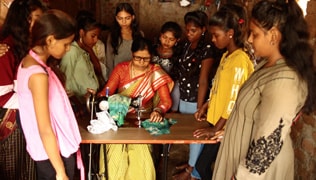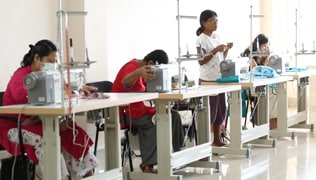- Home/
- Stories
Stories
USHA Silai Schools Are Providing Livelihood To The Marginalised Communities Of Assam
Written by Team NDTV | Wednesday October 26, 202248-year-old Diparani, from the Mising tribe in Assam, sustains her household by doing what she loves most - stitching
- Written by Barkha Mathur | Wednesday February 09, 2022
During the COVID-19 pandemic when people were struggling to earn a living, several women across the country benefitted from USHAs 'Adopt A Silai School' programme
- Written by Aastha Ahuja | Monday January 31, 2022
With an increase in the number of Silai Schools across the country, a need for more trainers to deliver quality training was realised and this led to the concept of Master Trainers, which has now been in practice for a few years
- Written by Barkha Mathur | Wednesday January 26, 2022
Silai Hero Sweta Sudarshan is the face of the joint initiative of USHA and UNFPA to take life skills to women in rural areas
- Written by Barkha Mathur | Wednesday January 26, 2022
USHA has been training rural women in sewing and stitching for 11 years. Now, with UNFPA, it is providing life skill education to help them earn a better income
- Written by Barkha Mathur | Friday January 21, 2022
USHA and Balrampur Chini Mills Limited have come together to help women in rural areas from Uttar Pradesh to open their own USHA Silai Schools and become financially independent
- Written by Barkha Mathur | Friday January 21, 2022
USHA and Aavas Foundation have joined hands to promote skill development among rural women in Rajasthan, Gujarat and Maharashtra
- Written by Barkha Mathur | Friday January 21, 2022
USHA Silai school, Government of Rajasthan and NGO Unnayan Samiti have come together to train women in four districts across the state
- Written by Barkha Mathur | Monday January 10, 2022
CWA (CRPF family Welfare Association) and USHA have collaborated to generate income prospects for the families of CRPF personnel
- Written by Barkha Mathur | Monday January 10, 2022
Gouri Debnath from Tripura is a shining example of a woman entrepreneur who has fought the odds to make a life for herself
Adopt a Silai School
About the Initiative

Kushalta Ke Kadam, an initiative by USHA Silai School and NDTV has entered its eighth season. The aim is to empower more women across rural India by teaching them sewing skills and helping them open new doors of opportunities for themselves. The initiative encourages rural women to become financially independent and entrepreneurs by taking up sewing and training others in their respective communities.
Since 2011, the USHA Silai School initiative has trained more than 12 lakh rural women through over 33,000 Silai schools, spanning over 20,751 villages across India.
The women earn Rs. 4,000 – 5,000 per month on an average, with the highest recorded monthly earning being Rs. 84,000 in a month. This earning works as a catalyst towards building their self-confidence, reducing gender inequities, and raising their stature within their families and in society at large.
In Pics

Rebari girls grow up learning traditional embroidery, which along with their new found sewing skills developed at Usha Silai Schools, is helping them earn a living.

Usha Silai School has empowered many rural women to support their family and send their children to school.

The Usha Silai School, established in a small nondescript village that goes by the name of Kottai, is helping empower people from varied communities.

The all-inclusive Usha Silai School Programme covers the entire nation from hamlets tucked between hills to villages cast by the sea.

Vegetables farmers from the Mizoram hills earn very little given the topography of the area. Usha Silai Schools have played an important part in this region by skilling women to financially contribute towards their households.

Usha Silai School learner Lucy has trained seven other women in her community, helping them to become financially independent.

Women like Kaviben from the nomadic Rebari community are finally laying down their roots as they begin to gain financial independence and thereby stability through Usha Silai School.

Usha Silai School, located in the Gujarat's Bhuj village, is enabling rural women to earn as much as Rs. 2,500-4,000 each month.

Usha Silai School, in association with a Gujarat based NGO called Kala Raksha, is trying to bring about a Silai revolution in Bhuj.

Besides training other women from their community, many Usha Silai School learners have become entrepreneurs in their own right.

With sewing becoming easily accessible and lucrative, the silai schools are also helping revive traditional motifs and designs.












